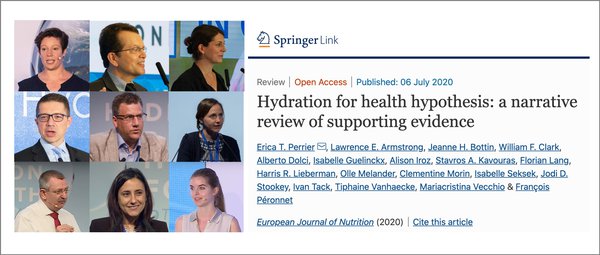Perrier E.T. et al. 2020
Hydration for health hypothesis: a narrative review of supporting evidence
Abstract
Purpose
An increasing body of evidence suggests that excreting a generous volume of diluted urine is associated with short- and long-term beneficial health effects, especially for kidney and metabolic function. However, water intake and hydration remain under-investigated and optimal hydration is poorly and inconsistently defined. This review tests the hypothesis that optimal chronic water intake positively impacts various aspects of health and proposes an evidence-based definition of optimal hydration.
Methods
Search strategy included PubMed and Google Scholar using relevant keywords for each health outcome, complemented by manual search of article reference lists and the expertise of relevant practitioners for each area studied.
Results
The available literature suggest the effects of increased water intake on health may be direct, due to increased urine flow or urine dilution, or indirect, mediated by a reduction in osmotically -stimulated vasopressin (AVP). Urine flow affects the formation of kidney stones and recurrence of urinary tract infection, while increased circulating AVP is implicated in metabolic disease, chronic kidney disease, and autosomal dominant polycystic kidney disease.
Conclusion
In order to ensure optimal hydration, it is proposed that optimal total water intake should approach 2.5 to 3.5 L day−1 to allow for the daily excretion of 2 to 3 L of dilute (< 500 mOsm kg−1) urine. Simple urinary markers of hydration such as urine color or void frequency may be used to monitor and adjust intake.
A word from our expert: Dr Erica Perrier, France:
“The past decade has seen a tremendous increase in scientific research into how hydration may interact with our long-term health. This paper assembles and reviews recent evidence for hydration and health; breaks down the evidence into two key mechanisms of action, and proposes updated terminology that will help researchers to correctly distinguish between dehydration (an acute state) and under-hydration, a potentially chronic state with possible health implications.”
Other abstracts you could be interested in...
- 11th Hydration for Health Annual Scientific Conference, Proceedings report of the 11th Annual Hydration for Health Scientific Conference published in the Annals of Nutrition and Metabolism, 2021
- 10th Hydration for Health Annual Scientific Conference, Proceedings report of the 10th Annual Hydration for Health Scientific Conference published in the Annals of Nutrition and Metabolism, 2019
- 9th Hydration for Health Annual Scientific Conference, Proceedings report of the 9th Annual Hydration for Health Scientific Conference published in the Annals of Nutrition and Metabolism, 2018
